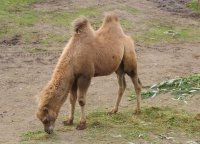Ascorbic acid, better known as vitamin C, is a strong antioxidant. It is therefore likely to have a positive effect on the immune system, thus offering resistance to diseases.
Bishari camels have the lowest concentration of ascorbic acid in their plasma, compared to Arabi camels and Anafi camels. Bishari camels are, therefore, likely to be more susceptible to diseases. Animals with Brucellosis and Mastitis appeared to have an even lower concentration of ascorbic acid. This suggests that infection diseases lower the animals resistance to illnesses even further.
Another remarkable point that came up from the research was the influence of camels diet on the level of ascorbic acid. As camels are ruminants, it is assumed that they are callable of producing vitamin C themselves from glucose. A lowered concentration of ascorbic acid showed, however, that natural desert vegetation had a negative effect, so that the camels were not protected optimally against diseases. Adding vitamin C to the diet does not seem redundant.
The vitamin C status of camels
12juli2006
Research has shown that the concentration of ascorbic acid in camels is determined by several factors.
